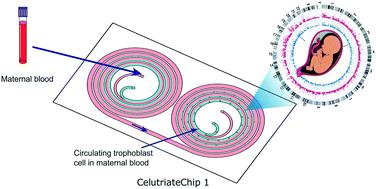Our official English website, www.x-mol.net, welcomes your
feedback! (Note: you will need to create a separate account there.)
Isolation of circulating fetal trophoblasts by a four-stage inertial microfluidic device for single-cell analysis and noninvasive prenatal testing
Lab on a Chip ( IF 6.1 ) Pub Date : 2020-10-23 , DOI: 10.1039/d0lc00895h Yifang Huang 1 , Sheng Yu , Shuzhe Chao , Limei Wu , Maliang Tao , Bo Situ , Xinyi Ye , Ye Zhang , Shihua Luo , Weishan Chen , Xiujuan Jiang , Guofeng Guan , Lei Zheng
Lab on a Chip ( IF 6.1 ) Pub Date : 2020-10-23 , DOI: 10.1039/d0lc00895h Yifang Huang 1 , Sheng Yu , Shuzhe Chao , Limei Wu , Maliang Tao , Bo Situ , Xinyi Ye , Ye Zhang , Shihua Luo , Weishan Chen , Xiujuan Jiang , Guofeng Guan , Lei Zheng
Affiliation

|
Noninvasive detection of circulating fetal cells carrying the entire fetal genome is a promising way for prenatal testing of genetic diseases. However, ideal approaches for efficient separation of these valuable cells are not available. Here, a novel inertial microfluidic chip (CelutriateChip 1) is developed for ultra-fast, label-free enrichment of circulating trophoblasts (CTBs) from the whole blood samples of pregnant women. The unique structural design of the four-stage curved channel in CelutriateChip 1 enables CTBs with larger size to be efficiently separated from the blood samples under the effect of inertial and Dean drag forces. The transition of the target cells among the stages enables CelutriateChip 1 to achieve one or two orders of magnitude higher throughput compared to single channel inertial microfluidic chips. After optimization of conditions, CTBs can be recovered from 2 mL of whole blood within 5 min with an average recovery efficiency ranging from 52.3% to 65.8% and high white blood cell depletion (99.95%). CTBs collected from the chip can be isolated at the single-cell level and used for downstream immunofluorescence staining and genetic genotyping. Clinical tests are performed on 30 pregnant women and the results demonstrate that CTBs are obtainable in 86.67% of pregnancy cases. A single-base variant in the HBB gene can be accurately detected by sequencing of rare CTBs. This simple, antibody-free and low-cost approach holds promise for obtaining rare CTBs for prenatal detection of various genetic diseases.
中文翻译:

四阶段惯性微流控设备分离循环胎儿滋养细胞,用于单细胞分析和无创产前检测
对携带整个胎儿基因组的循环胎儿细胞进行无创检测是对遗传疾病进行产前检测的一种有前途的方法。但是,没有有效分离这些有价值细胞的理想方法。在这里,开发了一种新型惯性微流控芯片(CelutriateChip 1),用于从孕妇全血样本中超快速,无标记地富集循环滋养层细胞(CTB)。CelutriateChip 1中四级弯曲通道的独特结构设计使较大尺寸的CTB能够在惯性和Dean阻力的作用下有效地与血液样本分离。与单通道惯性微流控芯片相比,目标细胞在各阶段之间的过渡使CelutriateChip 1的吞吐量提高了一个或两个数量级。优化条件后,可以在5分钟内从2 mL全血中回收CTB,平均回收率范围为52.3%至65.8%,白细胞耗竭率很高(99.95%)。从芯片收集的CTB可以在单细胞水平上分离,并用于下游免疫荧光染色和遗传基因分型。对30名孕妇进行了临床测试,结果表明,在86.67%的怀孕病例中可获得CTB。通过对罕见的CTB进行测序,可以准确检测出HBB基因的单碱基变异。这种简单,无抗体和低成本的方法有望获得用于产前检测各种遗传疾病的稀有CTB。8%和高白细胞耗竭率(99.95%)。从芯片收集的CTB可以在单细胞水平上分离,并用于下游免疫荧光染色和遗传基因分型。对30名孕妇进行了临床测试,结果表明,在86.67%的怀孕病例中可获得CTB。通过对罕见的CTB进行测序,可以准确检测出HBB基因的单碱基变异。这种简单,无抗体和低成本的方法有望获得用于产前检测各种遗传疾病的稀有CTB。8%和高白细胞耗竭率(99.95%)。从芯片收集的CTB可以在单细胞水平上分离,并用于下游免疫荧光染色和遗传基因分型。对30名孕妇进行了临床测试,结果表明,在86.67%的怀孕病例中可获得CTB。通过对罕见的CTB进行测序,可以准确检测出HBB基因的单碱基变异。这种简单,无抗体和低成本的方法有望获得用于产前检测各种遗传疾病的稀有CTB。怀孕病例的67%。通过对罕见的CTB进行测序,可以准确检测出HBB基因的单碱基变异。这种简单,无抗体和低成本的方法有望获得用于产前检测各种遗传疾病的稀有CTB。怀孕病例的67%。通过对罕见的CTB进行测序,可以准确检测出HBB基因的单碱基变异。这种简单,无抗体和低成本的方法有望获得用于产前检测各种遗传疾病的稀有CTB。
更新日期:2020-11-06
中文翻译:

四阶段惯性微流控设备分离循环胎儿滋养细胞,用于单细胞分析和无创产前检测
对携带整个胎儿基因组的循环胎儿细胞进行无创检测是对遗传疾病进行产前检测的一种有前途的方法。但是,没有有效分离这些有价值细胞的理想方法。在这里,开发了一种新型惯性微流控芯片(CelutriateChip 1),用于从孕妇全血样本中超快速,无标记地富集循环滋养层细胞(CTB)。CelutriateChip 1中四级弯曲通道的独特结构设计使较大尺寸的CTB能够在惯性和Dean阻力的作用下有效地与血液样本分离。与单通道惯性微流控芯片相比,目标细胞在各阶段之间的过渡使CelutriateChip 1的吞吐量提高了一个或两个数量级。优化条件后,可以在5分钟内从2 mL全血中回收CTB,平均回收率范围为52.3%至65.8%,白细胞耗竭率很高(99.95%)。从芯片收集的CTB可以在单细胞水平上分离,并用于下游免疫荧光染色和遗传基因分型。对30名孕妇进行了临床测试,结果表明,在86.67%的怀孕病例中可获得CTB。通过对罕见的CTB进行测序,可以准确检测出HBB基因的单碱基变异。这种简单,无抗体和低成本的方法有望获得用于产前检测各种遗传疾病的稀有CTB。8%和高白细胞耗竭率(99.95%)。从芯片收集的CTB可以在单细胞水平上分离,并用于下游免疫荧光染色和遗传基因分型。对30名孕妇进行了临床测试,结果表明,在86.67%的怀孕病例中可获得CTB。通过对罕见的CTB进行测序,可以准确检测出HBB基因的单碱基变异。这种简单,无抗体和低成本的方法有望获得用于产前检测各种遗传疾病的稀有CTB。8%和高白细胞耗竭率(99.95%)。从芯片收集的CTB可以在单细胞水平上分离,并用于下游免疫荧光染色和遗传基因分型。对30名孕妇进行了临床测试,结果表明,在86.67%的怀孕病例中可获得CTB。通过对罕见的CTB进行测序,可以准确检测出HBB基因的单碱基变异。这种简单,无抗体和低成本的方法有望获得用于产前检测各种遗传疾病的稀有CTB。怀孕病例的67%。通过对罕见的CTB进行测序,可以准确检测出HBB基因的单碱基变异。这种简单,无抗体和低成本的方法有望获得用于产前检测各种遗传疾病的稀有CTB。怀孕病例的67%。通过对罕见的CTB进行测序,可以准确检测出HBB基因的单碱基变异。这种简单,无抗体和低成本的方法有望获得用于产前检测各种遗传疾病的稀有CTB。











































 京公网安备 11010802027423号
京公网安备 11010802027423号